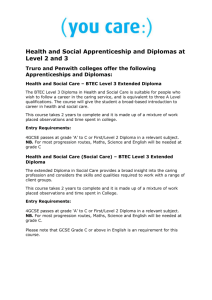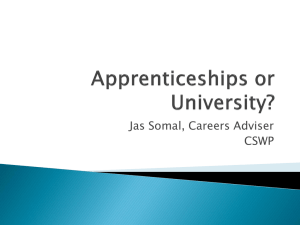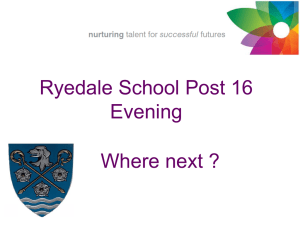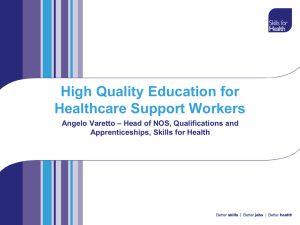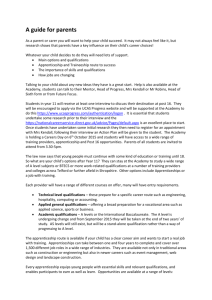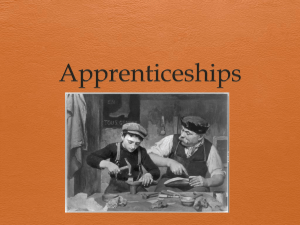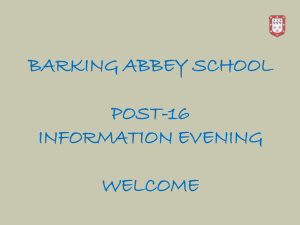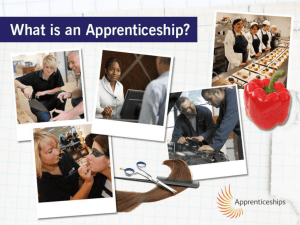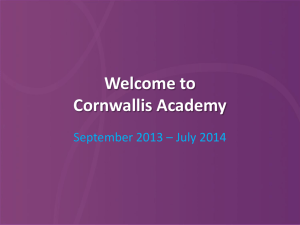Thinking about your future
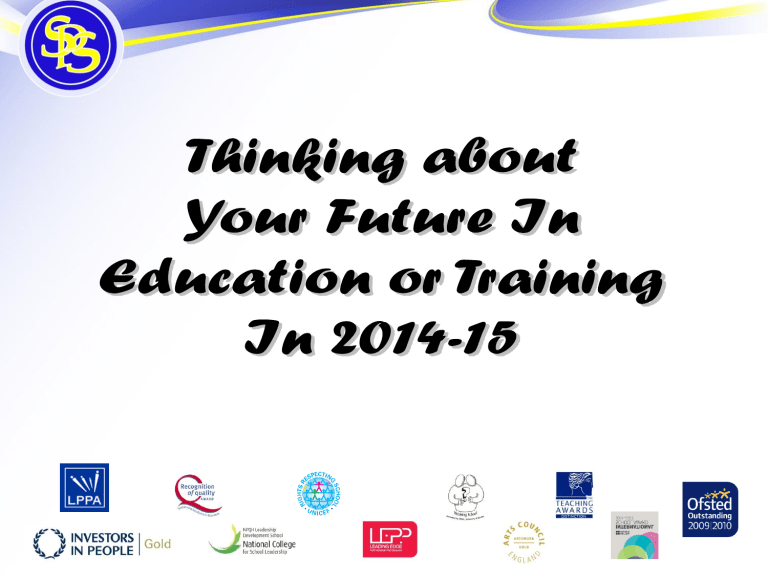
The purposes of this evening:
understand possible pathways for Post-16 education & training
have tools/plans for exploring next steps and even Post-18
develop thinking, which is aspirational and realistic for at least the next 1-2 years
Future jobs 2030?
Vertical farming
Future jobs 2030?
Body part maker
Future jobs 2030?
Insect based food developer
What benefits are there to gaining qualifications?
1980s/1990s Jobs 2012 Jobs
10% graduate only
30% need no qualifications
26% graduate only
23% need no qualifications
Average graduate earnings 52% higher than low qualified
Average graduate earnings similar to those with A levels
19.3% attend Higher Education
About 70 000
49% 17-30 year olds attend Higher
Education
About 400 000+
KEY STAGE FOUR CURRICULUM 2013 - 2015
TRADITIONAL
INTEGRATED
1 2 3 4 5 6 7 8 9 10 11 12 13 14 15 16 17 18 19 20 21 22 23 24 25
ENGLISH
ENGLISH
MATHS
MATHS
SCIENCE
CORE
SCIENCE
OPTION A
INTEGRATED
OPTION 1
OPTION B
INTEGRATED
OPTION 2
OPTION C
OPTION C
OPTION D
OPTION D PE
PE
Levels 4-8
Level 3
Level 2
Qualifications explained
Doctorate
Masters degree
Honours degree
Foundation degree / HND
HNC
Higher
Apprenticeship
GCE A levels
GCSEs grade A*-C
BTEC/Diploma
BTEC/Diploma
Advanced
Apprenticeship
Intermediate
Apprenticeship
Level 1
GCSEs grade D-G
BTEC/Diploma
Preapprenticeship
/ Traineeship
What is the RPA?
• Education or training until 18 th birthday
• Full-time education such as School or College
• Work based learning such as an Apprenticeship or
Traineeship
• Part-time education or training if you are employed, self-employed or volunteering full-time
(which is defined as 20 hours or more a week).
• Employment without training is not an option!
• However you could leave earlier if you have achieved level 3 qualifications e.g. 2 A-levels or their equivalent.
Why are English & Maths so important?
• Until 18 th birthday, need to continue studying for English and Maths UNTIL get
GCSE/iGCSE grade C or equivalent
• Functional skills level 2
• Grades in English & Maths affect what courses you can do Post-16
Post 16 Options
Further Education
•A Levels
•Diplomas e.g.
BTEC, UAL
Training
•Apprenticeships
•Traineeships
Part time Education or Training if:
•Employed
•Self-Employed
•Volunteering
What are popular A levels?
*
*
*
*
*
*
*
*
*
*
*
Art & Design
Business Studies
Dance
(Also known as GCEs)
Drama & Theatre Studies
Economics
English Language
English Literature
French
Geography
Government & Politics
German
History
*
*
*
*
*
*
ICT
Music
Mandarin
PE
Philosophy
Product design:
Graphics
Applied Science
Biology
Chemistry
Geology
Maths
Further Maths
Physics
* Product design:
Textiles
* Psychology
Consider University courses
Where to study
3 & 1
Essay writing subjects
Higher Apprenticeships
What are the entry requirements to do A levels?
AS & A2 Levels
• GCSE grades of at least a B in the subjects being studied, as well as at least a C in English and Maths
• Main route into university, especially Russell Group
(24 top universities)
Entry requirements for courses
Make sure that you are being realistic about entry requirements for courses.
Sometimes these are expressed as points: e.g. An average of 42 points for top 8 qualifications for A level entry to Sweyne Park, 32 points for A level/BTEC combined courses. (A* = 58 points, then each lower grade is 6 points less – 52,46,40(grade C),34…….)
Sometimes expressed as grades, with specific subjects noted.
Be REALISTIC and ASPIRATIONAL
Job sectors
Examples of BTECs/Diplomas & other professional qualifications?
(Various levels and sized qualifications)
* Animal management
* Applied science
* Art & design
* Beauty Therapy
* Bricklaying
Business
Carpentry & joinery
Children’s care learning & development
Engineering
Hairdressing
Health & social care
* Horse management
* Hospitality
* Professional cookery
* IT
* Media
* Music
* Music technology
* Performing arts
* Photography
* Public services
* Sport & exercise sciences
* Vehicle maintenance & repair
What are BTECs/Diplomas/Professional qualifications?
• a more practical approach
• level 3 can be a route to university, with A levels or
D*/D/M grade combinations
• Entry requirements depend on level, are specific to course, & where studied
Level 1: GCSEs 1-2 at A*-G
Level 2: GCSEs 2-4 at A*-D C?
Level 3: GCSEs 4-5 at A*-C, normally including
English and Maths
BTECs beware the names and sizes
• Extended diploma/diploma/foundation learning
• What to look for?
e.g. Construction level 3 Extended Diploma or
90 Credit Diploma
Construction level 2 Diploma
Foundation Learning – Level 1
Foundation Learning courses are one-year programmes that can help you to progress onto a Level 2 BTEC Diploma or Apprenticeship. It includes a vocational qualification, Functional
Skills in English, Maths & ICT, and Personal &
Social Development.
Apprenticeships – popular types…
• Animal care
• Catering
• Childcare
• Construction
• Engineering
• Hairdressing
• Horticulture
• Mechanics
• Office work
• Retail
• Veterinary nursing
Apprenticeships in outline…..
• Ready for work
• Earn & learn (£2.73 per hour minimum)
• Job training & college placements
• Functional skills
• Earliest start date July 1 st 2015
• Apprenticeships website
Apprenticeships
http://www.apprenticeships.org.uk
Next steps
What are you going to do next (as a family) about your Post-16 plans?
Helpful websites
• Careers information & advice http://prospectus.iessex.co.uk/
• National Careers Service https://nationalcareersservice.direct.gov.uk/Pages/Home.aspx
• Apprenticeships http://www.apprenticeships.org.uk/
• Complete University Guide http://www.thecompleteuniversityguide.co.uk/
• UCAS http://www.ucas.ac.uk/students/choosingcourses/admissions/
• Fast Tomato http://www.fasttomato.com/ and Login
• Unifrog https://www.unifrog.org/ and login
Key Points
• There is a course out there for everyone.
• Progression onto higher qualifications is possible via any route.
• C or above in English and Maths is very important – increasing choice and rate of progression.
• You can all be successful, invest in your futures now, by planning and trying as hard as possible at school.
Finally tips from me…..
• Get going right now, (do NOT panic) plan the Open
Evenings you are going to attend.
• Discuss with advisors, teachers, parents, family, friends……
• Get your questions sorted out before you go to an
Open Evening – remember your future relies on you making the right decisions about where to go and what to study.
• You need to have thought about how likely it is you achieve your first choice and consider back-up plans.
• Be aspirational and realistic – LOOK INTO THE FUTURE.
